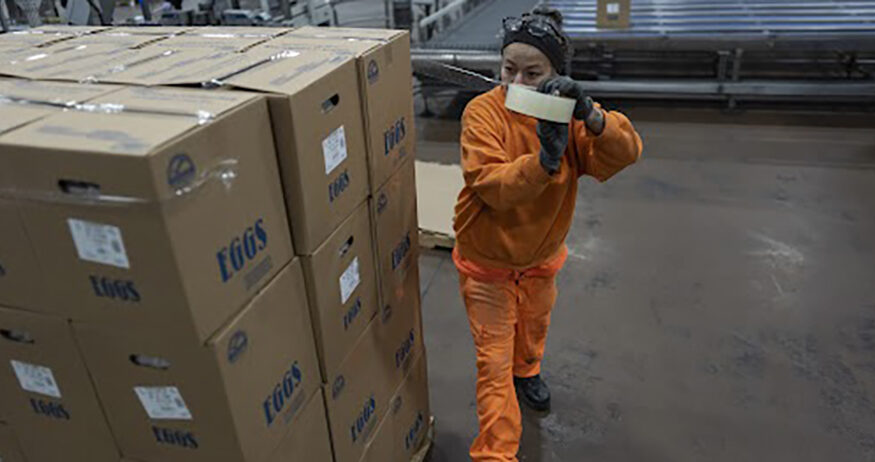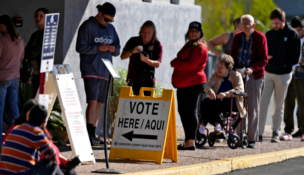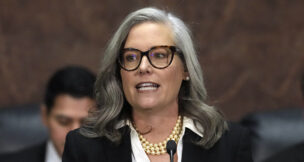Is the door open for change in the criminal justice system?
Kiera Riley Arizona Capitol Times//January 11, 2025//
Is the door open for change in the criminal justice system?
Kiera Riley Arizona Capitol Times//January 11, 2025//
Another legislative session means another swing at criminal justice changes, and this year advocates are hopeful for the passage of a home confinement bill and a continued conversation on wholesale oversight of the Department of Corrections, Rehabilitation and Reentry.
Though bills seeking the same aims stalled in past legislative sessions, a lawmaker and advocates for criminal justice changes sense a slowly growing appetite for greater oversight and a stronger consensus on reform of the state’s carceral system given the budgetary price tag attached to corrections.
“Lawmakers are starting to realize – and this goes to both criminal justice and to the government accountability here with the prison system – that brutality and harsh conditions and all these things … they don’t lead to enhancing public safety, and they don’t lead to better outcomes,” said John Fabricius, executive director for Praxis Initiative, formerly Arizonans for Transparency and Accountability in Corrections.
“These conversations have been a little bit easier to have in the last, I’d say, a year or two with lawmakers, from my perspective, I’m not finding as many people that have visceral reactions.”
Over the past two sessions, lawmakers, lobbyists and the Department of Corrections toiled over legislation allowing low-level offenders with no disciplinary infractions early release into a home confinement electronic monitoring program.
In 2023, former Sen. Steve Kaiser, R-Phoenix, sponsored an iteration of the bill which would have tasked the Department of Corrections with administering the program and the Board of Executive Clemency with vetting and approving program applicants.
But the legislation included no fiscal note to ensure the program’s implementation. The bill passed the Senate Judiciary Committee and a third read on the floor but failed in the House Military Affairs & Public Safety Committee.
In 2024, the bill came back sponsored by Rep. Kevin Payne, R-Peoria. It cut out the Board of Executive Clemency and included a note finding the bill would increase corrections’ costs by $7.2 million in FY2025 and $6.2 million in FY2027, but would ultimately be offset by a projected netsavings of up to $90 million per year within five years.
It passed the House Military and Public Safety Committee and on the House floor but failed to secure a Senate committee assignment.
As for the bill’s third go-around, Steven Scharboneau, lobbyist for Arizona Attorneys for Criminal Justice, said he believes all parties to be on the same page, noting support from the Corrections Department and law enforcement.
“It’s brought people together from all different angles, in all different sides of the justice system, and the political spectrum, who all do agree that there’s people right now in prison that don’t need to be,” Scharboneau said.
Others in the criminal justice space who had opposed the legislation have shifted to support and see its potential for passage now, too.
Donna Hamm, founder and executive director of Middle Ground Prison Reform, opposed the bill in the 2023 session given the burden it placed on the Board of Executive Clemency. With the tweaks to the bill, Middle Ground is now rallying behind it.
“I think that is probably the one that has the most possibility of consideration,” Hamm said. “By all means, it has a path to travel to get a wetted ink signature from the governor.”
Beyond home confinement, criminal justice advocates are looking at further oversight of the Corrections Department.
Republican Rep. Walt Blackman said he planned to sponsor legislation to create an independent oversight body dedicated to corrections, complete with full-time employees.
Rep. Analise Ortiz and Sen. Brian Fernandez, both Democrats, introduced similar legislation last session, with a proposal to create a Correctional Oversight Committee and the Office of Independent Corrections Oversight Committee.
The ultimately unsuccessful attempt came in response to the governor’s own shot at review via an executive order establishing the Independent Prison Oversight Commission.
Ortiz, Fernandez and Blackman all served on the commission and ultimately found the format limiting and returned a report finding a volunteer cohort housed in the Governor’s Office is “not the ideal framework for oversight work.”
Director Ryan Thornell of the Department of Corrections, Rehabilitation and Reentry lodged his own internal review committee on Dec. 17, tasking members to look at education, substance use disorder, mental health services and self harm prevention, reentry, vocational training and career readiness, tribal relations, peer mentorship and women’s service.
Advocates lauded the shot at further review by Thornell but noted some missing areas, like prison conditions and confinement and medical care. They still stressed the need for independent oversight given Corrections administration could change with the gubernatorial election in 2026.
“There’s a day after this director,” Fabricius said. “What we have seen historically is the directors to be more opaque and to be more closed. So, I think it is incumbent on the Arizona Legislature to pass oversight of the Department of Corrections … We pay an enormous amount of money to operate this department, yet we don’t have any real substantive oversight of it.”
Kurt Altman, lobbyist for Right on Crime, noted a more cooperative relationship between groups seeking change and Thornell, creating some semblance of hope for change, oversight or programming legislation in 2025.
Ahead of the start of the session, some criminal justice bills have already materialized. Rep. Selina Bliss, R-Prescott, introduced a bill permitting the Department of Corrections to extend transition services if deemed necessary, and Payne filed a bill to increase correctional officers’ salaries by 20%.
Blackman said, beyond oversight, he planned to introduce legislation addressing transition services. Altman said this session could also bring another look at mandatory sentencing and criminal record sealing.
How criminal justice fares this session is an open question, too, but change advocates are hopeful.
“It’s always a tough road with criminal justice in our Legislature,” Altman said. “The balance, especially on the right, is probably going to be the same … but it presents an opportunity for education of some of the newer members.”
Altman added that the recent prosecution of Cochise County Supervisors Peggy Judd and Tom Crosby and the ongoing case against the 2020 alternate electors may prompt a change of heart, too.
“Good, bad, indifferent, it may make some folks that are like law and order on the right to think twice about the power that’s out there, and how to balance that, mitigate it,” Altman said.
Blackman said he sensed at least some sects of the Republican majority were open to criminal justice policy change as well.
“Republicans in the state, they’re looking for new leadership in different areas now and are not so hawkish,” Blackman said. “They’re looking for results. They’re looking for common sense policy … people who believe in the core values of the Republican Party … Those folks have an appetite for good criminal justice reform.”












































